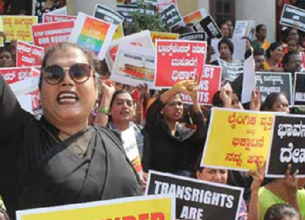TRANSGENDER RIGHTS BILL TO BE REINTRODUCED
05, Jun 2019

Prelims level : Governance
Mains level : GS-II Governance, Social Justice and IR
Why in News:
- In the first 100 days of the Narendra Modi government’s second term, the Social Justice
and Empowerment Ministry will reintroduce the lapsed Transgender Persons (Protection
of Rights) Bill, 2016 and pay out the ₹3,000-crore arrears in the scholarship scheme for Scheduled Caste students.
Background: Transgender Rights Bill:
- The bill creates a statutory obligation on public and private sectors to provide them with
employment and recognises their right to “self-perceived gender identity”. - A transgender person must obtain a certificate of identity as proof of recognition of identity as a transgender person and to invoke rights under the Bill.
- It also provides for a grievance redressal mechanism in establishments. It has provisions to establish a National Council for Transgenders.
- It makes the government responsible for preparing welfare schemes and programmes
which are “transgender sensitive, non-stigmatising and non-discriminatory”. - It holds that it is a crime to push transgender persons into begging or bonded or forced labour.
- The Bill recognises the rights of transgender persons to live with their families without exclusion and use the facilities of those households in a non-discriminatory manner.
- Employment – The Bill criminalises begging and prescribes a jail term for 6 months to 2 years for anyone who compels or entices a transgender person to indulge in the act of begging.
- This may harm the community, since in the absence of employment, transgender persons engage in begging as a means of livelihood.
- Reservation – The Bill states that the State will ensure the “rescue, protection and rehabilitation” of transgender persons.
- However, it fails to grant backward class reservation to trans people in education and public employment. Also recognition of civil rights in marriage, divorce and adoption among transgender persons have not been addressed.
- Rehabilitation – The bill bars forcible separation of transgender persons (including transgender children) from their families, except through court orders.
- They should either live with their natal “family” (blood or adoptive relations) or sent to rehabilitation centres. However, the bill failed to noted that it was within the family that many transgender persons faced harassment and abuse, and often felt driven to flee their homes.
- Also, when a parent or immediate family member is unable to take care of a transgender, they should be sent to a rehabilitation centre.
This controls the right to liberty of a cisgender people (people who identify with the same gender identity they were assigned at birth) and make them subjects of “care” which they do not want or need.







